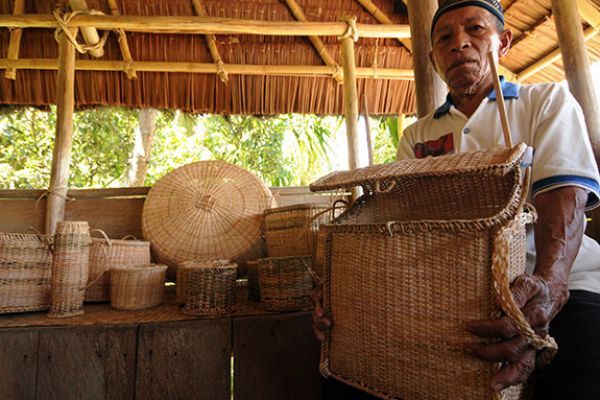CENTRAL SULAWESI, Indonesia – Rattan has long been a mainstay of Central Sulawesi (Sulawesi). However, since 2011, after the release of Trade Minister Regulation No. 35/2011 on the ban of export of rattan and rattan products, there was a downturn in the rattan industry. The ban on the export of raw rattan and semi-finished made many entrepreneurs go out of business.
The opposite occurred in the village of Namo. In the village, located in District Kulawi, Sigi, the rattan industry arose with renewed vigor. It is also as seen by Media Indonesia while visiting the village within 67 kilometers of Palu, Friday (13/5).
In the vicinity of the village, were hundreds of rattan canes are neatly tied been cleared.
In the houses of the residents handicrafts made of rattan were seen. There were baskets in different sizes and rattan based food covers.
The forest area of about 490 hectares in the village of Namo is abundant with various species of rattan.
Rattan batang, lambang, noko, and tohiti are some of the approximately 10 species of rattan that exist in the region.
Namo Village Secretary, Rusdin, revealed they were accompanied by non-governmental organizations (NGOs) to manage sustainable rattan.
“Local community members were trained on correct rattan collection, including how to sell raw rattan as well as to find the market and make profit. Previously, rattan collection was done, but illegally and not in proper sustainable way,” said Rusdin.
The Sustainable Rattan Programme (ROLES) was introduced to the village, which is inhabited by 374 families, by the Non-Timber Forest Products Exchange Programme Indonesia (NTFP-EP Indonesia) or in Indonesia is registered locally as the Foundation for the Development of Forest Resources Indonesia (PSDHI).
One concept promoted in the program is the Participatory Guarantee System (PGS).
In many countries, PGS is known in the organic farming field.
PGS is not only concerned with production, but the system also ensures a transparent market mechanism.
However, to implement the program, there are conditions that must be met.
Executive Director PSDHI Jusupta Tarigan describes that the legality of the area must be clear, including the legality of the village forest area (HD), permits for the collection of non-timber forest products-forest villages (IPHHBK-HD), the legality of the tax, freight, up to the primary industries.
The rights of the village forest itself has been given to the Village area Namo under the Ministry of Forestry’s decree in 2011.
Meanwhile, the village forest management rights were obtained from the Governor of Central Sulawesi in 2013.
To implement the program ROLES in Namo Village, PSDHI cooperated with the local NGO called IMUNITAS or Innovation Communities.
They then encouraged and supported the formation of the ROLES management units.
The unit consisted of 20 residents of four hamlets in Namo village.
It is they who are responsible for maintaining the management of the rattan in the village to meet sustainable standards.
Executive Director PSDHI Jusupta Tarin explaied sustainable standards, one being that the cane of the species found there must reach the age of at least seven years before it is harvested.
Then the citizens also have to plant cane to support regeneration in the future.
In this way, the productivity of rattan plants is quite good. Chairman of Immunits, Sadiq, explained during the trial ROLES period March-April 2016 rattan was harvested sustainably from Namo village as much as 20 923 [kilos consisting of 18 075 [kilos] of rattan batang, 696 tons of cane lambang, 263 tons of rattan noko, and 1,889 tons of cane tohiti.
“Seeing the abundance of the harvests that we achieved, we can say the ROLES trials succeeded,” he said in Palu on Tuesday (17/5).
Millions of rupiah
Raw rattan from Namo is then processed into semi-finished rattan by UD New Dawn which has become a program partner for the ROLES program.
Furthermore, the cane is being delivered to Cirebon and Surabaya for further processing.
Meanwhile, community members are also trying to process rattan from Namo into finished goods.
The activity was carried out with the assistance of Jambata Foundation. Production of finished products raised income significantly as well for the local people.
Staff of the Foundation Jambata, Zarlif, explained that a rattan vase can sell Rp 50,000 and Rp 150,000 for a rattan food cover while diffel bags are sold for Rp135,000. Sets of rattan chairs and tables are sold for Rp1.5 million to 2.5 million.
“Now the crafts they made already have a market. Now they have no difficulty to sell their products, especially since they make products the market is looking for”, said Zarlif.
Seeing the forest management has been running well, The District head of Sigi plans to build a special rattan industry for Namo village, including technical management unit (UPT) to hasten the process and make it a smooth one.
“We are still learning what that industry will need ” said the Vice District head of Sigi, Paulina.
She said the government will also ensure production does not threaten rattan sustainability there.
Original article “Bangkitnya Rotan Desa Namo” in Bahasa can be read here.




